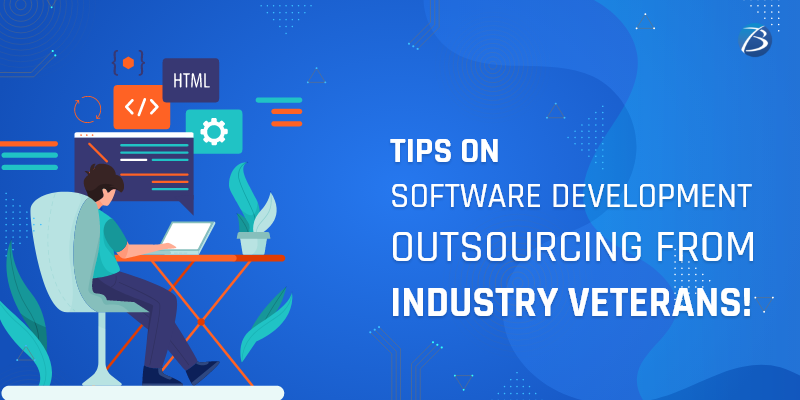Tips on Software Development Outsourcing from Industry Veterans!


The practice of outsourcing software product development projects to IT firms has proved to be a super-effective success formula, applied by several business brands big and small; ever since the inception of this approach. Outsourcing product development to global locations offering low-cost labor and highly skilled professionals, has proved to be immensely profitable for entrepreneurs.
Take a look at how these biggies benefitted from outsourcing:
WhatsApp, today’s most popular messaging brand, happened to be a small firm back in 2012, functioning with only thirty in-house employees and a few part-time professionals. They intended to grow while keeping the costs low and hence chose to outsource their development process to a Russian-based technology partner. Offshoring helped them to cut costs and focus on core business objectives during their initial years, helping them to grow exponentially.
Basecamp’s tool helped other enterprises in managing projects, but they were finding it difficult to handle the internal workflow and manage client support systems. So, they outsourced a portion of their essential functions, so that their in-house team is able to concentrate on their product and improve it for achieving the best outcomes.
Outsourcing proves to be an excellent strategic tool for businesses to maximize profits and minimize bottlenecks; only if executed properly. This post pens down some handy software development outsourcing tips coming from industry veterans and will guide you through the proper methodology to follow when hiring/managing outsourced help.
What is Outsourcing and why do businesses choose to outsource?
Outsourcing refers to the practice of hiring third-party services for delegating functions like software development, coding, testing, product support, etc. to a team of programmers or software outsourcing companies instead of engaging one’s in-house team for this purpose. The outsourced vendor provides the much-needed proficiency, innovative strategies, expertise, and experience for custom software application development. Moreover, the client enterprise can choose from a wide range of skillsets available around the globe and can even collaborate with different software service providers skilled in various technologies for developing a robust software product.
As per Igor Tkach, the CTO at Daxx, distributed teams have the potential to drive digital transformation. Organizations that opt for outsourced help experience a speedier transformation and therefore, stay a few steps ahead of their competitors. This approach is an efficient way of maintaining a uniform balance between budgetary constraints and digital transformation requirements.
Software Development Outsourcing Tips from Industry Experts
Sergii Zhuravel, Software Engineer
Software development outsourcing tips from Sergii suggests the factors that should be considered by product companies for cracking the best-suited outsourcing deal. The outsourcing partner must follow agile product development methodology; adhere to a properly-defined security policy, and have a functional knowledge transfer plan. The vendor should also possess robust project management skills, advanced tools for effective communication, transparency, and enthusiasm.
According to him, while selecting the region for offshoring services, watch out for the following factors – resource availability, technical education opportunities, English-speaking skills, tech competency, proficiency, diversity, global ratings of the company, etc.
Warith Niallah: Executive Head, “FTC Publications Inc.”
Warith’s outsourcing tips for software development is that he is against choosing a large-scale enterprise-level outsourcing vendor as they might prove to be far too expensive. Instead, one should examine the service offerings by all available service providers, irrespective of the magnitude of the outsourcing company, to validate whose services best suit your project needs as well as business objectives. The clients’ final decision should be based on the project requirement rather than the brand reputation of the vendor.
Martin Broadhurst, a UK-based Digital Strategist
It’s important for the client company to thoroughly understand the scope of the proposed project while outsourcing product development to offshore software developers. The project scope must be clearly defined at the very beginning and here, one needs to be really specific, so that there aren’t any arguments concerning deadlines and cost during the later phases of the project.
Eliza Nimmich: Co-Founder/COO, “Tutor the People”
Software development outsourcing tips from Eliza states that in order to ensure a productive partnership between the client company and its outsourcing partner, sound communication is essential. Here the level of sound communication depends on how effectively the vendor communicates their thought processing and how much they acknowledge the client’s perspective concerning the project workflow. If the outsourcing vendor displays sluggish behavior or a lack of good interaction, it is an indication of challenges going forward.
Steve Mezak: Founder/CEO “Accelerance Inc.”
Steve says that it isn’t a good idea to decide the outsourcing partner based on the project cost alone as quality may be compromised. Low-cost vendors are likely to deliver below-average software products with bugs, delay timelines, etc. resulting in costly rework. So, as per Steve, one should opt for the provider offering the right amount of skillsets and expertise.
Jan Kaminski, Co-Founder & Head of Sales at “Applover”
Jan says that the client company must thoroughly verify the service quality, expertise, and years of experience of the outsourcing services provider. For this, Jan recommends visiting the company’s website and checking their profile, credibility, skillsets, work culture, case studies of products delivered, and reviews by past clients. He also suggest checking for recognitions on online portals like GoodFirms, Clutch, etc. These checks will indicate whether the company is trustworthy and worth your investment.
Eric Carrell: The Chief Marketing Manager for SurfShark
Eric opines that micromanaging the developers is an unprofessional practice that should be avoided. According to Eric’s software development outsourcing tips, micromanagement subdues innovation and creativity, hindering development teams from producing the best possible results. Instead, if experienced professionals are allowed the freedom to experiment and apply their judgement, amazing outcomes can be achieved. And, to optimize developers’ output, business heads must focus on defining the final objective expected from the end-product rather than specifying developmental methods.
The process owners, a part of the outsourced team, should provide required resources, follow the best practices, and create a conducive development environment. They should also be well versed with the development methods so that they are able to pick the one that best suits the project needs as well as the company’s constraints.
He further suggests that the software product owners must peruse the product’s approach and progress from the perspective of an end-user – user tasks, user stories, etc. Moreover, while validating the software product they must involve a practical methodology – a functional prototype using a real device or even a simple wireframe.
Shawna Koch, Head of Healthcare and Biomedical, “SenecaGlobal”
As per Shawna’s outsourcing tips on software development, if one hires a single outsourcing vendor, it’s likely to give rise to a leadership silo and create an echo chamber, particularly if the firm is a huge one. And, this may reduce the velocity of the desired outputs and turn off room for innovation. So, hiring more than one vendor for specific developmental requirements is a good idea.
Brian Dean, Founder, “Exploding Topics”
Brian says that the client firm should have a sound strategy to overcome all hurdles. Some of the roadblocks likely in outsourcing are poor project management by the vendor firm, below-average product quality, etc. So, the product owner needs to establish an in-house leader (a CTO, CIO, or technical co-founder) often named as the ‘Product Owner’ who will serve as the bridge between the business and the professionals involved in product development. This ‘Product Owner’ will be responsible for the product development process executed by outsourced developers.
Sreenivasan Iyer: Product-oriented C-suite Executive, “Shasta Ventures”, San Fransisco.
Sreenivasan’s tips for software outsourcing points out a challenge involved in software development – the difference in time-zones might create unwanted roadblocks and adversely affect productivity. According to him, this challenge can be successfully addressed by dividing work amongst distributed teams to minimize the need for continuous communication. This is indeed an effective way of avoiding late-night and early-morning meetings for offshore teams.
Veronica Miller, Cyber security Expert, “VPNoverview”
Veronica stresses maintaining consistent communication practices between both parties to convey well-defined methodologies during different phases of the project. This will help in ensuring that the daily development efforts are in accordance with product objectives. Veronica suggests some best practices for effective communication.
Here are her tips for software outsourcing! Daily stand-up meetings help in keeping everyone on the same page. Frequent check-ins by product owners can avoid unwanted surprises & save time. Retrospective sessions after the completion of each sprint help in identifying issues, discussing product improvement schemes, and deciding on the modifications that can enhance the development process during the next sprint.
Closing Thoughts
Outsourcing is a strategic move for delegating the responsibility of building customized application software or complex software product development projects to proficient Offshore teams who can handle it efficiently. And, offshoring projects help you to obtain the best of global talents at affordable rates. If executed correctly, the outsourcing approach will facilitate continuous innovation, speedy releases, and humongous profits.
In this regard, Biz4Solutions, a distinguished software development company in India, the most popular outsourcing destination, would be a great choice. We have partnered with myriad business brands for the last 10+ years and helped them to create success stories.


